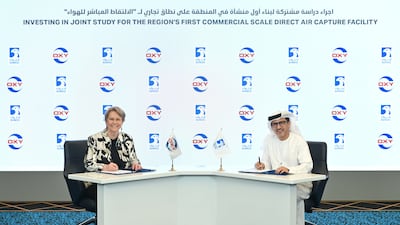Adnoc and Occidental have signed an agreement to undertake a joint preliminary engineering study to build the first megaton-scale direct air capture plant outside the US amid the energy industry's push towards decarbonisation.
The study will assess the proposed one million tonnes per annum direct air capture facility to be connected to Adnoc’s carbon dioxide infrastructure for injection and permanent storage into saline reservoirs not used for oil and gas production, Adnoc said in a statement on Tuesday.
Adnoc is in the testing phase of the world’s first full sequestered carbon dioxide injection well in a carbonate saline aquifer in Abu Dhabi.
The latest agreement is the first project to reach the technical feasibility stage since Adnoc and Occidental signed a strategic collaboration agreement in August to explore carbon capture, utilisation and storage (CCUS) projects in the UAE and the US.
The move is part of efforts by the two companies to "significantly scale up promising carbon management technologies", said Musabbeh Al Kaabi, executive director for low carbon solutions and international growth at Adnoc.
"This joint investment in the proposed first megaton direct air capture facility in the region exemplifies Adnoc's commitment to leverage partnerships and promising technology to accelerate our decarbonisation journey on the way to net zero by 2045.”
Adnoc recently revised its plans to reach net-zero emissions by 2045, from a target of 2050. The company also aims to achieve zero methane emissions by the end of the decade.
Last week, Sheikh Khaled bin Mohamed, Crown Prince of Abu Dhabi and chairman of Abu Dhabi Executive Council, reviewed the progress of Adnoc’s carbon management strategy and its ambition to double its carbon-capture capacity to 10 million tonnes a year by 2030.

The company has allocated $15 billion to invest in projects up to 2030, which will help its low-carbon growth strategy.
Along with CCUS, these projects include clean power, further electrification of operations, energy efficiency and new measures to build on its policy of zero routine gas flaring.
Last month, Adnoc also confirmed plans to develop one of the largest CCUS projects in the Mena region at Habshan, with the capacity to capture up to 1.5 million tonnes per annum for permanent storage in Abu Dhabi’s onshore reservoirs.
As part of the deal signed with Occidental in August, the two companies will evaluate potential investment opportunities in CCUS hubs in the UAE and US.
“The speed at which the [two companies] have developed the feasibility and Pre-Feed plan for a [direct air capture] plant in Abu Dhabi underscores the urgency needed to deliver global-scale climate solutions and eliminate greenhouse gas emissions," said Vicki Hollub, president and chief executive of Occidental.
Adnoc and Occidental also plan to incorporate climate technologies in energy projects such as emissions-free power and sustainable fuels.
New carbon capture plant
Adnoc also announced on Tuesday that it is teaming up with Fertiglobe, the world’s largest seaborne exporter of urea and ammonia, to set up a 10-tonnes-per-day carbon capture unit at a nitrogen fertiliser plant in Ruwais.
The "world’s first cost-effective modular CycloneCC carbon capture unit", developed by UK-based Carbon Clean, is designed to improve carbon capture within industrial facilities, Adnoc said.
The carbon dioxide captured using the CycloneCC unit will work alongside an existing Adnoc project to sequester the gas within Abu Dhabi’s onshore carbonate aquifers.
The pilot deployment of the unit, currently being manufactured in the UAE, will start next month.
If successful, more carbon capture units could be installed across Adnoc and Fertiglobe’s operations.
"We are moving a step closer to achieving full commercialisation of this modular solution which will play a vital role in decarbonising heavy industries and achieving net-zero targets," said Aniruddha Sharma, chairman and chief executive of Carbon Clean.


